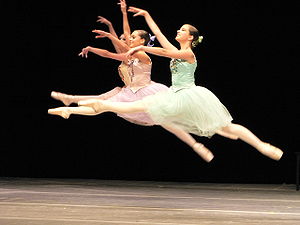Will or Shall

Shall We Dance?
I will love to.
Will or Shall
Bobby: Is it the will of the god to make us suffer with will and shall?
bun: No, of course not, the god is forever merciful, but you can be very stylish with both will and shall in your pocket. See, would you ever imagine inviting a lady “Will we dance?”
Bobby: Oh!, no you are kidding.
bun: Exactly, now you got the point.
Bobby: You know you are a goddamn asshole, you always got a point.
bun: Well, I will [*1] do all possible under the heavens to keep my point sharp.
Booby: You, pervert!, Is that how you speak to a young lady?
bun: I shall, [*2] of course, if that is the will of the god!
Bobby: May the Lord almighty wills it.
bun: Amen
will [*1] strong determination
shall, [*2] : simple statement
Jennifer Lopez: Shall we dance, Mr Clarke?
Richard Gere: I will love to.
https://www.youtube.com/watch?v=tBJj-3sgcd0
 |
 |
| WILL THEY FLY? | SHALL WE DANCE? |
A mother of a grade 4 student thought it fit to share with me how her daughter has made a mess of her precious [eh!] marks at the end of the year English language test thanks to her careless errors in the usage of will and shall. I uttered to myself that there were blacker sins in our world. [With apologies to Krishna, R. K. Narayan’s “English Teacher”, an autobiographical novel prescribed for Cambridge OL Literature] Since it could hardly be the will of the almighty god for the young learners to suffer with the conundrum of will or shall, I thought it would be good idea to make a blog entry presenting an Easy way out. But then, it isn’t that easy. The grammarians have their own contrasting opinions. Even elementary Grammar books aren’t in a mood to a make the matters easier for the young learners.
However, in speech, we can easily hide the difference between shall and will by the contraction ‘ll. But, of course, the difference does exist.
|
1
|
Page 102, Grammar Builder 2 by A. Amin, R. Eravelly & F.J. Ibrahim Cambridge University Press Year 2006 ISBN 0-521-54860-8
|
|||||||||
|
THE TRADITONAL RULE
|
THE EASY WAY OUT
|
|||||||||
|
In the past, the simple future tense was formed using
shall for I & we, And
will for other pronouns and nouns
|
Nowadays,
it is more common to use will for all nouns and pronouns |
|||||||||
|
2
|
http://www.oxforddictionaries.com/words/shall-or-will
|
|||||||||
|
THE TRADITONAL RULE
|
THE EASY WAY OUT
|
|||||||||
|
The traditional rule in standard British English
I shall be late.
They will not have enough food.
—————————————————
The exception to the above convention
However, when it comes to expressing a strong determination to do something, the roles are reversed:
I will not tolerate such behaviour.
You shall go to the ball!
|
In
practice, though, the two words are used more or less interchangeably, and this is
now an acceptable part of standard British
and
American
English. |
|||||||||
|
3
|
Page 22, Advanced Grammar In Use by Marin Hewings , Cambridge
University Press, 2001 ISBN 0-521-49868-6 |
|||||||||
|
THE TRADITONAL RULE
|
THE EASY WAY OUT
|
|||||||||
|
In current English we don’t use shall/shan’t with other subjects (it, she, they, etc.) when we talk about the future)
|
||||||||||
|
4
|
Page 64, Essential English Grammar by Raymond Murphy, Cambridge university Press, 2007 ISBN 81-7596-309-3
|
|||||||||
|
THE TRADITONAL RULE
|
THE EASY WAY OUT
|
|||||||||
|
But do not use shall with you/they/he/she/it
|
||||||||||
Of course, in speech, we can hid our ignorance of proper usage of “will” and ‘shall” thanks tto the contraction ‘ll. But the difference does exist.
The truth is that there are two conjugations for the verb will:
| 1st conjugation (objective, simple statement of fact) | |||
|---|---|---|---|
| person | verb | example | contraction |
| I | shall | I shall be in London tomorrow. | I’ll |
| You | will | You will see a large building on the left. | You’ll |
| He, She, It | will | He will be wearing blue. | He’ll |
| We | shall | We shall not be there when you arrive. | We shan’t |
| You | will | You will find his office on the 7th floor. | You’ll |
| They | will | They will arrive late. | They’ll |
[*1] However, when it comes to expressing a strong determination to do something, strong assertion, promise or command the roles are reversed:
| 2nd conjugation (subjective, strong assertion, promise or command) | |||
|---|---|---|---|
| person | verb | example | contraction |
| I | will | I will do everything possible to help. | I’ll |
| You | shall | You shall be sorry for this. | You’ll |
| He, She, It | shall | It shall be done. | It’ll |
| We | will | We will not interfere. | We won’t |
| You | shall | You shall do as you’re told. | You’ll |
| They | shall | They shall give one month’s notice. | They’ll |
Then again the difference between will and shall is not universally recognized.
The merits of shall and will are often brought into the limelight, as in “Shall we dance?”
See how pleasing the following formal statements too.
Each party shall give one month’s notice in writing in the event of termination.
Again see, how stylish following statement making use of past tense of shall and would
I should be grateful if you would kindly send me your latest catalogue.
If I swore you were an angel would you treat me like the devil tonight?
If I were dying of thirst would your flowing love come quench me?
If I said you had a beautiful body would you hold it against me?
bunpeiris
